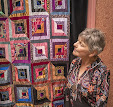Margaret Ogilvy by Her Son, J.M. Barrie
This little book, picked up in a local second-hand bookshop, is Barrie's adulatory account of his mother's life and his relationship with her, published after her death in 1896. It's a fairly maudlin read, but tells us much about Barrie's early emotional life. J. M. Barrie was born in the village of Kirriemuir, in Forfarshire (now Angus), the son of a handloom weaver. His mother, Margaret Ogilvy was the daughter of a stonemason. The couple had ten children, of whom Barrie was the ninth. Jamie, as he was called, heard tales of pirates from his mother, who read her children adventure stories in the evenings. Barrie's father Barrie rarely makes any appearance in his autobiographical works, and in this book is only mentioned at the very end.
Before her marriage, Margaret Ogilvy belonged to a religious sect called the Auld Lichts, or Old Lights, and many of the stories concerning it inspired Barrie's later work. When Barrie was seven, his brother David died in a skating accident. David had been the mother's favourite child, and his death plunged her into the depression from which she never fully recovered. Apparently, her only comfort was in the thought that David would never grow up and leave her and it is suggested by some that this thinking may have inspired Barrie's creation of Peter Pan, the boy who never grew up. Barrie tried to comfort his mother and gain her affection by dressing up in the dead boy's clothes, but for a period after David's death she took little interest in him or anything else.
This book memorialises the obsessive relationship which over time grew up between them, a relationship which remained a strong influence throughout Barrie's life.


3 comments:
There's no doubt that this is an interesting book, Celia, but I think Barrie's version of events needs to be taken with a small dose of Sodium Chloride.
This is probably going to be a lengthy comment but I hope you will find it interesting.
Barrie once warned: "May God blast anyone who writes a biography of me," yet in her 2005 biography, 'Hide-and-Seek with Angels', Lisa Chaney wrote that Barrie's "biography" of his mother is "a fabrication of a version of autobiography that Barrie found endurable".
In reviewing Chaney's book in The Observer, Frances Wilson said that "Several biographers before Lisa Chaney have defied Barrie's censure but each has felt the near impossibility of the task. The main problem is that we know so much and understand so little. But there is also the fact that the main sources for his life come from Barrie himself, and he was unable to write about material reality without injecting it first with fantasy."
Quite rightly, Celia, you refer, as do all Barrie's biographers, to the influence of the relationship between the boy and his mother, and the traumatic effect on the boy of the mother's prolonged grieving over the death of his older brother, David, in a skating accident. Tragic as this incident was, it has been shown recently (by myself and a Dutch 'Barriephile') that David did not die in the skating accident (if, indeed, there was a skating accident).
Examination of David Barrie's death certificate shows that he died of 'Inflammation of the brain - one week', and that death occurred on a date which has been shown to be about a week after the accident. Obviously the original cause of the 'inflammation' may have been the knock which David's head suffered when it hit the ice, but none of the previously published accounts indicate that David's parents were not informed of their son's serious condition so late as one week after the accident!
Armed with the facts evident from the death certificate, and also historical weather condition information, I think it is reasonable to doubt Barrie's account. But we must remember that he was only six years old when this tragedy struck the family. Who knows what may really have happened, and what the boy may have been told?
It occurs to me that Margaret Ogilvy's protracted grieving could have been due to exceptional feelings of guilt: At the time of the skating accident, David was a boarder at his eldest brother Alexander's school in Bothwell, Lanarkshire. Are we to believe that Alexander Barrie waited a week before telling his parents about the accident? Or did he tell them promptly but not indicate the seriousness of David's head injury? Whatever happened, and whoever may be blamed in retrospect, did Margaret have to live with the dreadful knowledge that she could so easily have travelled to Bothwell a few days earlier and seen David while he was alive?
Thanks for comment, Atticus, and apologies for tardy reply. I'll e-mail you in case you've given up checking this site up in despair!
Hi Celia, I have what I believe to be a first edition of this book, published by HODDER AND STOUGHTON in 1896..Do you know what the value of it would be? I also have his book COURAGE, which is his Rectorial address at St Andrews University May 3rd 1922.By HODDER AND STOUGHTON LIMITED, LONDON.
Thank you
Harry Morris
Post a Comment